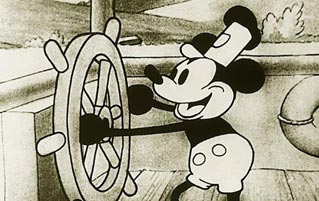Why January 1, 2019 Was A Big Day For You (And Mickey Mouse)

Yesterday, most people celebrated the first day of 2019 as they usually do. New Year's Day is the holiday when ambitious resolutions immediately get broken because you wake up in a hungover puddle of your own regret, and you'd rather die than do a single push-up. But that's only because folks have forgotten the true meaning of January 1. Long ago, it was Public Domain Day -- the time when Old Saint Intellectual Property Lawyer came around and gave us a whole year's worth of free old music, literature, and other assorted works to play with. Not that it's anyone's fault for forgetting. We haven't had a Public Domain Day in 21 years. But in 2019, it's finally back.
Public domain operates on the principle that artistic freedom can only flourish if old intellectual property is allowed to be reused, abused, and remixed without obstacle. It's the reason that every time you draw a stick figure, you don't have to pay up so the descendants of Urgh Cavescratcher can fund their new pool. In the U.S., works currently enter the public domain 95 years after the year of their creation. So on January 1, 2019, every single bit of media from 1923 became public domain, meaning we are free to post YouTube clips of Cecil B. DeMille's silent version of The Ten Commandments and stream games while listening to the Charleston to our heart's content. But if that sounds like a ridiculously long time to wait on some free flapper entertainment, you should really blame one person: Mickey Mouse.

Not too long ago, the average shelf life of a piece of entertainment was about long as a bottle of off-brand cola with the cap missing. Most intellectual properties stopped making money long before the creator's passing, so U.S. copyright laws felt it generous to put the public domain on a 58-year timer, extended to 75 years in 1978. They definitely didn't anticipate, say, an immortal multi-billion-dollar empire to be made on the back of a black-and-white cartoon rodent. But then Disney and Mickey Mouse came along -- in 1928, to be specific.
So when the public domain started creeping up on the iconic first Steamboat Willy cartoon in 1998, the company refused to let just anyone put their dirty, white-glove-less hands on their mascot. Disney and other big entertainment corporations successfully lobbied the government, which passed a 20-year copyright extension called the Sonny Bono (husband of Cher) Act. And because of that, we've been living in a Disney-induced public domain wasteland for so long that newspaper columnists can't even blame Millennials for ruining it.
Luckily, since then the internet has swung along, and according to some activists, Disney and its ilk no longer dare to push for even more extensions, out of fear that they'll get memed to death. But sadly, the damage is already done. Between 1978 and 1998, public domain rights were pushed back decades, meaning if it hadn't been for corporate greed, all art before 1962 would now have been free to use. And who knows what 21st-century culture up to this point would've looked like if basement musicians had had all of Bob Dylan and Elvis Presley to work with? Maybe some postmodern author had made The Great Gatsby & Zombies, and children would've had to reenact with endless middle-school productions of World War II propaganda movies.
For more weird tangents and his personal recipes for toilet wine, do follow Cedric on Twitter.
If you loved this article and want more content like this, consider a trip to our Contribution Page. Please and thank you.
For more, check out The Fortnite Dance Lawsuits Are Super Important (Seriously) and The Plot Of The Rejected 'Home Alone' Sequel Was Insane.
Also, we'd love to know more about you and your interesting lives, dear readers. If you spend your days doing cool stuff, drop us a line at iDoCoolStuff at Cracked dot com, and maybe we can share your story with the entire internet.
Follow us on Facebook. Because we love you.